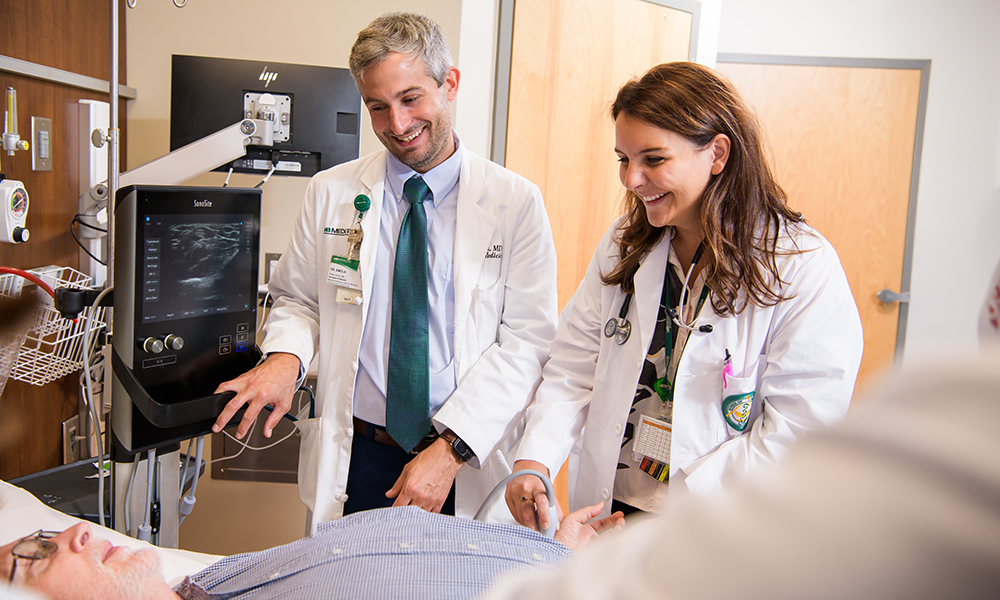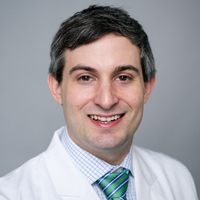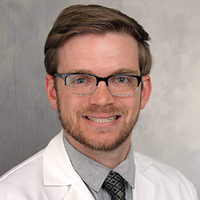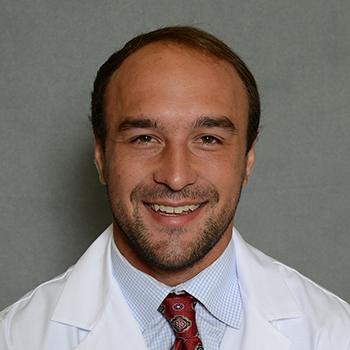The Point-of-Care Ultrasound (POCUS) Track builds on our comprehensive curriculum, offering residents a valuable opportunity to enhance their diagnostic and clinical skills while contributing to the growth of this essential tool within our residency program.

The POCUS Track is open to all PGY2-3 internal medicine residents and PGY2-4 medicine/pediatric residents, regardless of career goals. It includes participation in our longitudinal POCUS curriculum, full completion of the online Butterfly Academy curriculum, a reviewed image portfolio, skills and knowledge assessments, and serving as a POCUS instructor. Track participants will have priority for the 4-week POCUS elective and the “POCUS Scholar” year, which offers the chance to earn our internal “POCUS Certification of Completion.”
Ultrasound Knowledge and Skills
Cardiac
-
Evaluation of left ventricular systolic function.
-
Evaluate for presence of pericardial effusion and suggestive findings of cardiac tamponade.
-
Compare right versus left side cardiac chamber sizes.
-
Identify inferior vena cava and internal jugular veins and use them to estimate right atrial pressure.
Pulmonary
-
Assess for pneumothorax using pleural sliding and lung point using 2D and M-Mode.
-
Identify A-line vs. B-line profile.
-
Identify C-profile and air bronchograms (static vs. dynamic).
-
Identify pleural effusion and estimate for safety of bedside thoracentesis.
Abdominal/Genitourinary/Bladder
-
Locate abdominal ascites in right upper quadrant, left upper quadrant, suprapubic, and paracolic gutters and estimate for safety of bedside paracentesis.
-
Recognize suggestive findings of medical renal disease.
-
Identify simple renal cysts and be able to differentiate from complex renal cysts.
-
Identify hydronephrosis (mild, moderate, severe) and evaluate for possible causes.
-
Estimate bladder volume size in workup of acute urinary retention.
-
Identify foley catheter and recognize findings of non-functioning foley catheter in bladder.
-
Identify findings of prostamegaly.
Vascular
-
Evaluate the femoral and popliteal regions for suggestive findings of venous thrombosis.
-
Evaluate the abdominal aorta to assess for aortic dilation or aneurysm.
Musculoskeletal
-
Identify cobblestoning as a marker of subcutaneous edema.
-
Evaluate for soft issue abscess and/or foreign body.
-
Evaluate for joint effusion and assess for safety of bedside arthrocentesis or joint injection.
Procedural
-
Use ultrasound guidance to assist with successful completion of bedside procedures including central line insertion, dialysis catheter insertion, arterial line insertion, paracentesis, thoracentesis, lumbar puncture, and arthrocentesis.
POCUS Elective
This 4-week elective (or 2 weeks combined with 2 weeks of pulmonary experiences) is available once a year to PGY2-3 internal medicine and PGY2-4 medicine/pediatric residents. It includes pre- and post-elective assessments of knowledge and skills. The curriculum features didactic learning, hands-on sessions with low resident-to-faculty ratios, clinical time with the VA POCUS/Procedure team, and personalized educational activities to align with individual career goals. Residents will also complete a faculty-reviewed image portfolio, contributing to the internal "POCUS Certification of Completion."
POCUS Scholars
The POCUS Scholar position, established in 2023-2024, offers motivated residents enhanced POCUS education and learning opportunities. This 1-year role requires an application, and selected residents will work closely with POCUS curriculum directors Drs. Andy Marshall and Rob Smola as mentors. We seek applicants passionate about POCUS and medical education. POCUS Scholars will represent the Tinsley Harrison Residency in medical student education at UAB Heersink School of Medicine. Scholars receive a personal handheld ultrasound for portfolio development and, upon completing the curriculum, earn the internal “POCUS Certification of Completion.”
Perspectives from Prior POCUS Scholars
Any questions? Let's Talk.
We'd be delighted to talk with you about the POCUS track of the Tinsley Harrison Internal Medicine Residency Program. Contact us for more details.

Rob Smola, MD, Director
Assistant Professor
General Internal Medicine

Andy Marshall, MD, Associate Director
Assistant Professor
Medicine and Pediatrics

